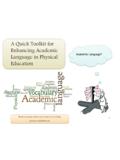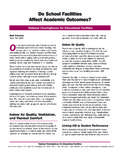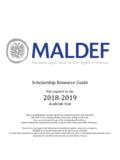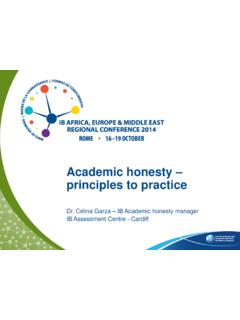Transcription of PREPARING FOR AN ACADEMIC JOB INTERVIEW: …
1 1 PREPARING FOR AN ACADEMIC JOB interview : frequently asked questions for on-site and phone interviews Prepared by DIALOG VI Symposium Participants Robert W. Campbell, Institut f r Hydrobiologie und Fischereiwissenschaft, University of Hamburg, Germany M. Claire Horner-Devine, School of Aquatic and Fishery Science, University of Washington Julien Lartigue, Marine Science Institute, University of Texas at Austin Gretchen C. Rollwagen Bollens, School of Biological Sciences, Washington State University Vancouver Congratulations! If you are reading this, you likely have put together a very successful application package and are PREPARING for an interview .
2 This paper builds on discussions at the November 2004 DIALOG VI Symposium for recent graduate (see ). Most of the forty participants were in temporary postdoctoral positions so there was great interest in the job-application process. Several of the participants had recently been interviewed, so the symposium provided a useful forum for exchanging information and insights. See also suggestions on applying and interviewing for jobs prepared by the 2002 DIACES Symposium participants, We have put together this article to share our insights with a larger audience. We hope you will find them useful.
3 First of all, always keep in mind that the interview for a position is very important both in terms of giving your potential department a chance to evaluate you, but also for getting a sense of whether the position and department are a good fit for you. What follows is a list of questions intended to help you prepare for your upcoming interview . To get the most out of your interview , it helps to spend some time thinking about what kinds of questions you might be asked , how to answer those questions and what sorts of questions you would like to ask. We present these questions as a list broken into categories, including research, teaching, institutional/departmental issues, and personal/professional development.
4 We finish by providing some general interview suggestions based on our experience and some suggestions for phone interviews, since these seem to be increasing in frequency. These lists are not meant to be exhaustive they simply reflect our recent experience as interviewees. Some of the questions may not be relevant to all positions and universities. And, of course, each interview is different, and you may be asked an array of questions not on our lists. However, we do expect that reading through these lists and PREPARING answers to at least some of the questions will serve at least three useful purposes: 1.
5 It will help you identify the sorts of questions for which you should have ready answers when you interview . 2. It will help you identify (and hopefully answer) some questions that are important for your own personal and professional development. 3. Perhaps most importantly, thinking about these questions and your own answers will get you thinking in interview mode. (That is, to get yourself into the routine of thinking broadly about your interests and goals, and articulating these goals in a way that makes a potential employer think: I d like to work with this person! ) 2 Even if the questions presented here are not asked when you interview , we hope you will benefit from the practice they provide in terms of thinking through answers.
6 They might also help you think of some questions that you would like to ask while you are visiting. Phone Interviews: Phone interviews seem to be growing more common as search committees try to make the difficult decision of who to invite for a campus interview . When one of us was PREPARING for a phone interview for a tenure-track faculty position, a senior colleague shared a list of questions that he thought would likely come up. As it turns out, he was exactly right, and she was able to sail right through the interview , was invited to campus for in-person interviews, and was ultimately offered the position!
7 If you are not interviewed by phone, these same questions are likely to be asked on site. Questions (in generally the order they were asked ): Why are you interested in this position? How will/could you involve students in your research? What courses could you teach here? (Check out the course offerings in the department ahead of time and use actual course numbers to refer to the courses you could step into, as well as new courses you might propose.) What sorts of research projects/topics could you pursue here? (Check out the research interests of the other faculty in the department, and mention possible areas for potential collaboration, or possible dovetails with current research.)
8 What kinds of facilities would you need to conduct your research and teaching here? (If possible, get a sense of what major items are already in place (such lists are often on departmental/college websites) and talk about how you could use what s there, as well as anything new you would need/want.) When could you start in the position? What do you see as your greatest accomplishments in your career to date? What short-comings have you dealt with? How would you describe your interactions with students? What questions do you have for us? (You should prepare several questions in advance.)
9 Asking these questions led to more lively discussion among the interviewers and allowed everyone s individual personalities to emerge.) On-Site Interviews: The following questions are in no particular order and reflect our personal experiences. Some of these questions could also come up in a phone interview , although probably not the more detailed ones. So even if you are only at the phone interview stage, it would be helpful to review these, too. Research Why did you choose your dissertation (post-doc) topic? Tell us about the theoretical framework of your research. What changes would you have made to your dissertation or post-doctoral work if you were to begin again?
10 What contribution does your dissertation make to the field? Tell me about your research. ( asked by a Dean who didn t know the field) Why didn't you finish your dissertation sooner? What are your research plans for the next 2/5/10 years? What are possible sources of funding to support your research? 3 What are your plans for applying for external funding? When will you have sufficient preliminary data for a grant application? What facilities do you need to carry out your research? How does your research fit in with this department? Who would you collaborate with? What kind of startup package do you need?





